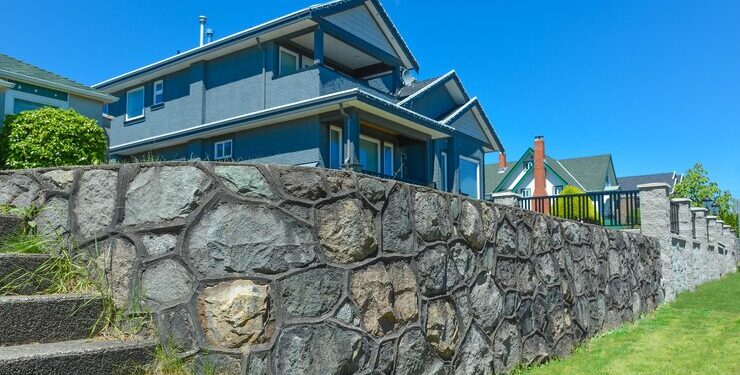When it comes to enhancing the beauty, stability, and functionality of your landscape, rock retaining walls are a smart choice. These walls are not only attractive but also serve practical purposes that contribute to the longevity and usability of your outdoor space. From preventing soil erosion to creating defined spaces for gardens or seating, rock retaining walls offer numerous advantages.
If you’re considering a new landscaping project or looking to elevate your existing design, let’s discuss why rock retaining walls might be the perfect addition. In this guide, we’ll explore the benefits, types, and key considerations of rock retaining walls to help you create a landscape that’s both beautiful and resilient.
1. Erosion Control and Soil Stability
One of the primary reasons people build retaining walls is to combat soil erosion. If your yard or garden is on a slope, water runoff can quickly wash away soil, destabilizing plants and creating a muddy mess. Rock retaining walls provide a solid barrier that holds soil in place, slowing down the erosion process and ensuring that plants and soil remain stable.
- Prevents Soil Loss: The wall acts as a barrier, preventing soil from washing away during rainstorms or heavy watering.
- Protects Plant Health: Retaining walls help retain nutrient-rich topsoil that plants rely on, promoting healthier plant growth.
- Enhances Drainage: Retaining walls can be designed with proper drainage channels, preventing water buildup and keeping soil from becoming overly saturated.
By installing a rock retaining wall, you’re not only enhancing your landscape’s appearance but also preserving the integrity of your yard and reducing the need for frequent soil replenishment.
2. Versatile Design Options and Aesthetic Appeal
One of the most appealing aspects of rock retaining walls is their natural beauty. Rocks bring texture, color, and depth to your landscape design, allowing you to create a look that complements your home’s exterior and surrounding environment. Whether you prefer a rustic, rugged look or something more refined, rock retaining walls can be customized to fit various styles.
- Variety of Rocks to Choose From: There are numerous types of rocks available, from natural stone like limestone and sandstone to river rock and slate. Each type has its own color palette, texture, and character, allowing for a high degree of customization.
- Complementary Landscaping: Rock retaining walls can be paired with other landscaping elements such as garden beds, water features, and walkways for a harmonious and cohesive look.
- Enhanced Curb Appeal: A well-built rock wall can boost the aesthetic appeal of your property, making it more inviting and attractive. This added beauty can even increase your property value.
Rock retaining walls can be crafted to appear as organic extensions of the natural surroundings or as statement features in modern landscapes. This versatility makes them an excellent choice for any landscape style.
3. Durability and Low Maintenance
Another key advantage of rock retaining walls is their durability. When constructed properly, these walls can last for decades with minimal upkeep. Rocks are naturally resistant to weathering, which means they can withstand exposure to the elements far better than many other materials.
- Longevity: Unlike wood or some other materials that degrade over time, rock is highly resilient and can endure seasonal changes, heavy rain, and extreme temperatures.
- Minimal Maintenance: Rocks require little to no maintenance beyond occasional cleaning. This makes rock retaining walls an excellent option for homeowners looking for a low-maintenance landscape solution.
- Resistance to Pest Damage: Rock walls are less susceptible to damage from insects or pests, which is often a concern with wood retaining walls.
By choosing a rock retaining wall, you invest in a long-lasting structure that can handle the demands of nature, saving you time and money on repairs or replacements.
4. Maximizing Usable Space and Creating Terraced Gardens
If you have a sloped yard, it can be challenging to find enough flat, usable space for outdoor activities or gardens. Rock retaining walls offer a practical solution by creating flat terraces on different levels of the slope. These terraces can be used for planting, seating areas, or even pathways, turning previously unused space into functional outdoor zones.
- Terraced Gardens: Rock walls allow you to create terraced gardens where you can grow vegetables, flowers, or shrubs on each level. This adds layers and visual interest to your garden while maximizing planting space.
- Outdoor Seating and Gathering Areas: Use terraces for setting up benches, tables, or even a fire pit area. A well-designed retaining wall can make your yard more accessible and enjoyable.
- Pathways and Walkways: Retaining walls can be combined with steps or pathways, making it easier to navigate steep areas and providing a more structured flow to your landscape.
By transforming sloped areas into usable zones, rock retaining walls can significantly expand the functionality of your outdoor space.
5. Environmentally Friendly and Sustainable
In an age of increasing environmental consciousness, rock retaining walls are a green choice for landscaping. Many rock types are locally sourced and natural, meaning they don’t require extensive processing or harmful chemicals. This contributes to a smaller environmental footprint and aligns with sustainable landscaping practices.
- Eco-Friendly Materials: Rocks are a natural, biodegradable material, unlike some synthetic building products that take centuries to break down.
- Sustainable Construction: When properly designed, a rock wall is a long-lasting structure that doesn’t need frequent replacement, reducing the demand for resources.
- Reduces Carbon Footprint: Because rock walls have minimal maintenance requirements and no toxic coatings, they contribute to a healthier and more sustainable environment.
Choosing a rock retaining wall is an environmentally conscious decision that aligns well with today’s sustainable landscaping trends, making it a responsible choice for homeowners.
6. Adding Value to Your Property
Adding rock retaining walls can increase the value of your property by boosting curb appeal, improving functionality, and providing an elegant yet natural look. Rainier Rockeries excels in building durable rock retaining walls in Seattle, WA, offering unmatched craftsmanship that enhances both functionality and aesthetics for your landscape. Potential buyers often appreciate thoughtfully designed landscapes, especially those that maximize space and demonstrate durability.
- Increased Aesthetic Appeal: A professionally constructed rock wall adds beauty and visual appeal, enhancing the overall look of the property.
- Improved Usability of Yard Space: Usable outdoor space is a desirable feature for homebuyers. Terraced gardens, seating areas, and paths created by retaining walls make your landscape more functional and attractive.
- Low Maintenance and Long-Term Value: Potential buyers may view rock retaining walls as a low-maintenance, high-value addition that’s built to last, which can contribute to a higher resale value.
If you’re thinking of selling your home in the future, rock retaining walls are an investment that can pay off, attracting buyers who appreciate quality landscape design and functional spaces.
Choosing the Right Rock Retaining Wall for Your Landscape
Now that we’ve discussed the many benefits, how do you choose the right type of rock retaining wall for your landscape? Here are some considerations to keep in mind:
- Type of Rock Material
The rock you choose can impact both the look and durability of your wall. Natural stones, such as granite or limestone, are strong and long-lasting. River rocks or fieldstones offer a more rustic appearance, while cut stones provide a more uniform, modern look. - Wall Height and Structural Needs
Depending on your landscape’s slope and soil conditions, your wall may need to be reinforced or professionally engineered. Taller walls require expert design and construction to ensure stability and safety. - Drainage Solutions
Proper drainage is essential for retaining walls. Consider consulting with a landscape professional to incorporate drainage channels or perforated pipes that prevent water buildup, which can weaken the structure over time. - Professional Installation vs. DIY
While smaller rock walls might be manageable for DIY enthusiasts, larger or taller walls are best left to professionals who understand the principles of weight distribution, soil pressure, and drainage.
Final Thoughts: Is a Rock Retaining Wall Right for You?
Rock retaining walls offer a beautiful, durable, and functional solution for managing slopes, enhancing your landscape’s aesthetic appeal, and creating more usable space. They’re a sustainable choice with low maintenance needs and can even increase your property’s value. Whether you’re looking to prevent soil erosion, create terraced gardens, or simply add a touch of natural elegance to your yard, rock retaining walls provide both practicality and style.
Are you ready to transform your outdoor space? With their timeless appeal and solid benefits, rock retaining walls might be the perfect addition to your landscape.

















